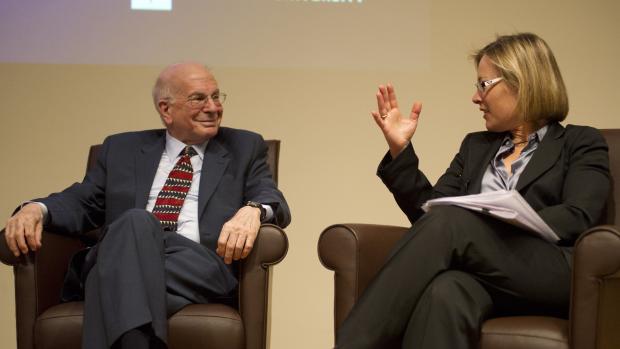The End of Intuition: Daniel Kahneman Speaks at 14th-Annual Lynford Lecture

A decade ago Daniel Kahneman received the Nobel Prize in economics, despite never having taken a single course on the subject. Could anyone have looked into a crystal ball and predicted such a future for someone so enamored of psychology, the discipline in which Kahneman trained? All suggestions lean toward no—not because such fantastic-seeming outcomes are impossible, but because intuition of the kind vaunted by fortune-tellers and, on occasion, stockbrokers doesn’t exist.
“Intuition is simply another word for expertise,” Kahneman told the audience at Pfizer Auditorium at the Polytechnic Institute of New York University last week during the 14th-annual Lynford Lecture Series, sponsored in part by the Institute for Mathematics and Advanced Supercomputing (IMAS).
Gillian Tett, author of Fool’s Gold: How Unrestrained Greed Corrupted a Dream, Shattered Markets, and Unleashed a Catastrophe and the U.S. managing editor at the Financial Times, joined Jeffrey Lynford, vice chair of NYU-Poly’s board of trustees and who, along with his wife Tondra, is a generous supporter of the series, and Nassim Nicholas Taleb, author of The Black Swan and the Distinguished Professor of Risk Engineering at NYU-Poly, onstage as a guest panelist during the event’s Q&A session, which featured queries submitted online by pre-registered attendees and a question from Patrick Foye, executive director of the Port Authority of New York and New Jersey.
The talks, which have featured such luminaries as technology pioneer Robert Metcalfe, economist Myron Scholes, and computer scientist Frances Allen, “are one of the ways that NYU-Poly sets the stage for great thinking, changing the world, exciting our students, innovating—all the things that great universities do,” said Jerry Hultin, president of the Institute, in his opening remarks.
Lynford followed Hultin to introduce Kahneman, whose Thinking, Fast and Slow topped numerous best books lists compiled by such publications as the New York Times Book Review and the Wall Street Journal when it was released late in 2011. Lynford referenced it in his introduction when he asked attendees, “Should we think fast or slow in our daily lives,” before summarizing Kahneman’s research, which argues that human reason is flawed by factors such as illusions of control, poor memory—“some of us know about that,” said Lynford, drawing laughs—and a tendency to overstate benefits and underestimate costs.
Discussions Prompt Further Inquiry
Two conversations fueled the observations shared in his book, said Kahneman. The first was one he began with economist Amos Tversky long ago, when his then-colleague shared a draft of a paper titled “The Psychological Assumptions of Economics,” which posited that humans are internally coherent, “that their beliefs and choices make sense when viewed in the aggregate. They do not contain contradictions.”
“From a psychologist’s point of view, this is simply absurd,” continued Kahneman, “No finite brain could do this.”
The second topic is one supported by Kahneman’s peer Gary Klein, a psychologist who emphasizes the value of intuition in our decision-making processes. Kahneman parses Klein’s position further, suggesting that we rely on intuition when making non-critical decisions or analyses. This is because, he argues, “intuition is [pattern] recognition.” When we understand intuition as a form of expertise that arises only out of consistent exposure to a situation that provides rapid feedback, then we’ll make better decisions, continued Kahneman, citing driving lessons as a type of intuitive thinking: We learn how to drive and improve our driving only through regular practice that offers feedback quickly. For instance, we only need to swerve into incoming traffic once to learn not to do it again.
What Next?
Is it possible to translate the findings of Thinking, Fast and Slow into either trading strategies or policymaking, asked Tett, who also pushed Kahneman to imagine how his research might be applied in an elementary or secondary school setting, where children might be taught how to recognize the cognitive biases that typically inform our decision-making.
To Tett’s inquiry, Kahneman confessed that he didn’t believe intuition could be improved upon over time. “I’ve been studying intuition for 45 years, and I’m no better than when I started,” he said. “I make extreme predictions. I’m over-confident. I fall for every one of the biases.”
To counter such missteps, Kahneman ended by reiterating one of the conclusions of his book. “When it really matters, slow down,” he entreated the audience.




